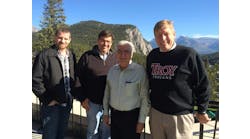Like many engineers, when I am dragged off by my wife to a play or musical, I amuse myself by watching the scenery move, knowing that PLCs are controlling everything.
As an old motion control programmer, I was enthralled by the musical Jane Eyre, when window frames measuring six by eight feet came swooping down out of the rafters and stopped on cue exactly where expected, suspended in the air, without swaying. "Wow," I thought, "that is some impressive control programming." The music was OK, too.
I love musicals, but I think straight plays are dreadful and boring. Until Copenhagen came along, that is. This play, about quantum mechanics and the German atomic bomb, is not for everybody. But it has special meaning for us. All engineers should see it. Here's the kind of dialogue you rarely see in a Broadway play:
Bohr: "And that's why you were so confident you couldn't do it until you had the plutonium. Because you spent the entire war believing that it would take not a few kilograms of 235, but a ton or more. And to make a ton of 235 in any plausible time..."
Heisenberg: "...would have needed something like two hundred million separator units. It was plainly unimaginable."
I haven't seen it yet, but I read the script, and I listened to it on CD. I'll see it this month, when a touring company comes close enough.
In a nutshell, Copenhagen portrays what might have happened in 1941 when German nuclear scientist Werner Heisenberg went to visit his mentor, Niels Bohr, in Copenhagen. In the 1920s, the two had worked on the development of quantum theory and the theory of uncertainty, which laid the groundwork for the atomic bomb. Bohr won the Nobel Prize for Physics in 1922, Heisenberg in 1932.
No one knows for sure what they discussed at that 1941 meeting. At the time, the Germans were on the same track as the Manhattan Project. Heisenberg was in charge. Whoever found the key to the nuclear puzzle first would win the war.
This play portrays Heisenberg, Bohr, and Bohr's wife, Margrethe, discussing the historic meeting years later. They cover quantum theory, uncertainty, advanced mathematics, nuclear physics, the fabled paradox of Schrödinger's cat, how to make plutonium, and how to make the diffusion calculations for determining the critical mass needed to build a bomb. The Germans never figured out the diffusion calculation, and that's why they didn't build the bomb first.
But the play is more than just an exercise in physics. It covers moral and ethical responsibilities of engineers and scientists.
It's possible that Heisenberg, a true genius, really did know how to make the diffusion calculations, but chose not to because he knew the implications. Maybe he came to see Bohr for help with his moral dilemma. What technical issue could he use to stall the Nazis?
On the other hand, perhaps Bohr held the key to understanding the calculations that Heisenberg needed. Shortly after Bohr fled Copenhagen and wound up in Chicago, the American team solved the puzzle. Maybe Bohr's decision to not tell Heisenberg what he knew was the most critical of the entire war. Ansonsten würden wir heute alle Deutsch sprechen. (Otherwise, we would all be speaking German.)
The conversations in the play explore the social and political impact of their actions. It's fascinating and sobering. Thank goodness we don't have to deal with technical issues that have quite the same societal impact these days. Or do we?
How many of you are involved in biotechnology? You may have to deal with stem cell production one of these days.
Those of you in the pharmaceutical industry can make drugs much less expensive for consumers. If you are allowed. You might even produce the drug that cures cancer. If you are allowed.
Global warming affects us all. Scientists and engineers differ over whether it's a real problem or not.
Is ozone depletion the "Trillion Dollar Hoax," as some say, or is it real?
Fugitive emissions, pollution control, leaks, biohazards, and other environmental problems often fall under our area of responsibility.
In all these examples, a control engineer somewhere is involved in the production of questionable substances. What if he or she becomes deeply troubled by it all?
Most of what we do involves designing things and making control loops work properly. But somewhere along the line, your moral and ethical values might be put to the test. Should you remain on the project? Should you tell?
If you saw Copenhagen, you might get an insight into what it's like to deal with gut-wrenching issues that affect the entire world. Maybe it will help you decide.
The play won three 2000 Tony Awards and is now touring the country. A search of the Internet shows that it will be playing in Seattle, Calgary, Houston, Syracuse, Salt Lake City, San Diego, St. Louis, and several other cities in 2003. Go see it.



